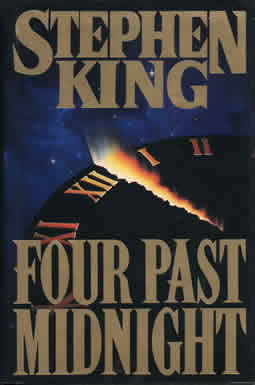

Released
September 24th, 1990
Available Format(s)
In Collection
A man accuses author Mort Rainey of stealing one of his story ideas. Rainey, who is going through an ugly divorce, attempts to prove to his accuser that his own story was published first, but all evidence to support his argument begins to disappear, along with the people who might confirm his case.
... I published a novel called Misery, which tried, at least in part, to illustrate the powerful hold fiction can achieve over the reader. I published The Dark Half, where I tried to explore the converse: the powerful hold fiction can achieve over the writer. While that book was between drafts, I started to think that there might be a way to tell both stories at the same time by approaching some of the plot elements of The Dark Half from a totally different angle. Writing, it seems to me, is a secret act--as secret as dreaming--and that was one aspect of this strange and dangerous craft I had never thought about much.
I knew that writers have from time to time revised old works--John Fowles did it with The Magus, and I have done it myself with The Stand--but revision was not what I had in mind. What I wanted to do was to take familar elements and put them together in an entirely new way. This I had tried to to at least once before, restructuring and updating the basic elements of Bram Stoker's Dracula to create 'Salem's Lot, and I was fairly comfortable with the idea.
One day in the late fall of 1987, while these things were tumbling around in my head, I stopped in the laundry room of our house to drop a dirty shirt in the washing machine. Our laundry room is a small, narrow alcove on the second floor. I disposed of the shirt and then stepped over to one of the room's two windows. It was casual curiosity, no more. We'd been living in the same house for eleven or twelve years, but I had never taken a good hard look out this particular window before. The reason is perfectly simple; set at floor level, mostly hidden behind the drier, half blocked by baskets of mending, it's a hard window to look out of.
I squeezed in, nevertheless, and looked out. That window looks down on a little brick-paved alcove between the house and the attached sunporch. It's an area I see just about every day . . . but the angle was new. My wife had set half a dozen pots out there, so the plants could take a little of the early-November sun, I suppose, and the result was a charming little garden which only I could see. The phrase which occurred to me was, of course, the title of this story. It seemed to me as good a metaphor as any for what writers--especially writers of fantasy--do with their days and nights. Sitting down at the typewriter or picking up a pencil is a physical act; the spiritual analogue is looking out of an almost forgotten window, a window which offers a common view from an entirely different angle . . . an angle which renders the common extraordinary. The writer's job is to gaze through that window and report on what he sees.
But sometimes windows break. I think that, more than anything else, is the concern of this story: what happens to the wide-eyed observer when the window between reality and unreality breaks and the glass begins to fly?
There are no links for this Novella.